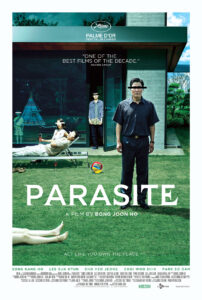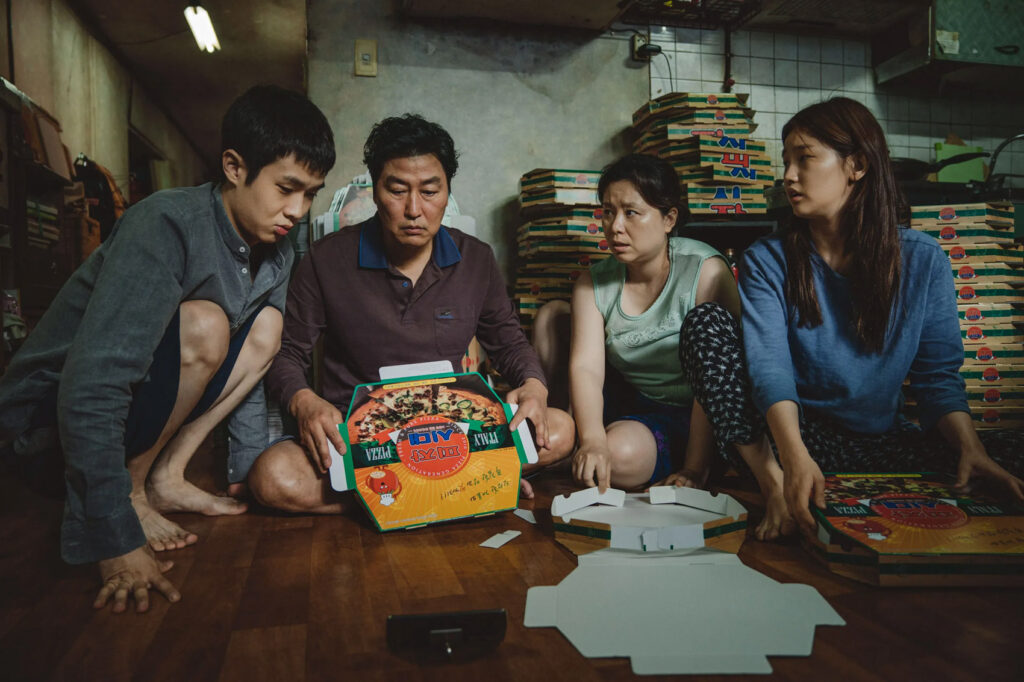Bong Joon-ho’s 2019 film “Parasite” is an unparalleled feast for the senses and intellect, seamlessly melding an array of diverse elements into a cohesive, masterfully crafted narrative. This cinematic tour de force tangles viewers in a web of fascination, discomfort, irony, and revelation from the very beginning, refusing to let go until its shocking denouement. It is a film that does not merely blur the lines between genres; it shatters them entirely, emerging as a transformative piece of contemporary cinema with a deep-seated commentary on social disparity and class stratification.
The film starts with the Kim family, living in a semi-basement apartment, struggling to make ends meet. When the son, Ki-woo (Choi Woo-shik), gets an opportunity to tutor a wealthy family’s daughter, the narrative shifts into high gear, blending dark comedy with incisive social critique. The wealthy Park family stands in stark contrast to the Kims; their extravagant, sprawling house epitomizes opulence and privilege. As Ki-woo’s sister, Ki-jung (Park So-dam), secures a position as an art tutor for the Parks under false pretenses, the Kims systematically infiltrate the household by displacing the original employees. What begins as a clever heist film gradually morphs into a suspenseful thriller and ultimately, a heart-wrenching tragedy.

Its setting in South Korea is relevant, although not integral, to the films’ overall purpose of portraying inequality and social mobility in a very cynical and pessimistic light.
Bong’s genius lies in his ability to use these genre conventions to serve his broader social commentary. The intricate plot threads are woven together with extraordinary finesse, making each scene dense with meaning. The Kims’ basement dwelling is juxtaposed with the Parks’ glass-walled mansion, highlighting the literal and metaphorical gaps between the lives of the rich and the poor. This contrast is continually explored and expanded upon, making the relationship between the Kims and the Parks a microcosm of broader societal disparities.
“Parasite” employs incredibly articulate visual and dramatic idioms that keep the audience both engaged and unsettled. Cinematographer Hong Kyung-pyo works magic, using framing, lighting, and camera movement to amplify the narrative’s emotional undertones. The way the camera captures the architectural labyrinth of the Park residence is particularly striking; it feels both inviting and confining, an ironic prison for its inhabitants. This setting often feels like a character itself, with labyrinthine hallways and hidden bunkers that hold dark secrets and societal truths.
The performances by the cast are universally stellar, adding rich texture to the film. The ensemble, led by the inimitable Song Kang-ho as the patriarch Kim Ki-taek, imbues the film with a raw, palpable authenticity. Each actor brings depth to their role, ensuring that no character is a mere caricature. There’s a deeply human element to the Kims’ con, making it impossible not to empathize with their plight even as one is repelled by their deceit.
The screenplay, co-written by Bong Joon-ho and Han Jin-won, is taut and layered with irony. The dialogue is sharp, often laced with dark humor that brings levity to the otherwise grim subject matter. Yet, it never undermines the film’s underlying gravitas. For instance, the recurring theme of smell — with the Parks often complaining about the Kims’ scent — serves as a stark reminder of the intangible yet omnipresent barriers between the classes.
“Parasite” doesn’t merely present a binary of rich versus poor; it explores the nuances and contradictions within these categories. The Parks, despite their wealth, are portrayed as naïve and out of touch with reality, while the Kims, in their struggle, exhibit resourcefulness and resilience. Yet, Bong Joon-ho does not sanctify the poor or demonize the rich; he presents a more complex picture where both families are flawed and human.
As the narrative careens towards its explosive climax, the developing tension unravels the thin facade of civility that both families maintain. The literal and metaphorical floods that occur wash away these facades, revealing the brutal truths buried beneath. The shocking violence of the finale serves as a cathartic release and a grim reminder of the destructive power of systemic inequality.
In conclusion, “Parasite” is a cinematic masterpiece that defies categorization and compels its audience to confront uncomfortable truths. Bong Joon-ho’s direction ensures that every element, from the performances to the set design, contributes to a rich, multi-layered narrative. It is a film that not only entertains but also provokes thought and discussion, marking it as both a cultural and artistic milestone. “Parasite” is not merely a film to be watched; it’s a film to be experienced, understood, and remembered.



